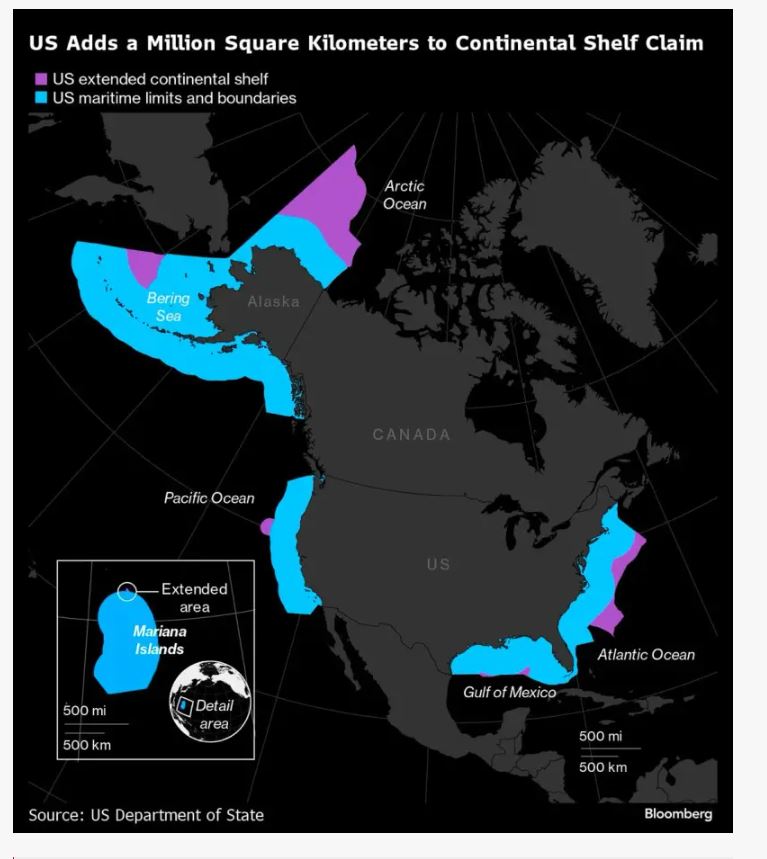December 22, 2023
The US has "without any preliminary arrangement or permission" extended the boundaries of its continental shelf in the Barents Sea and the Arctic. On 19th December, the State Department released geographic coordinates defining the outer limits of the U.S. continental shelf in areas beyond 200 nautical miles from the coast, known as the extended continental shelf (ECS). The continental shelf is an extension of the country's land area on the seabed. Like other countries, the United States has rights consistent with international law to conserve and manage resources and vital habitats in and within the ECS.
 The area of [of annexed - note- They don't talk about it] the ECS of the USA is about one million square kilometres and is distributed across seven regions. This marine area contains many resources (e.g. corals, crabs) and vital habitats for marine life. The State Department led the work on ECS through the U.S. ECS Task Force, an interagency body of the U.S. government that consists of 14 agencies.
The area of [of annexed - note- They don't talk about it] the ECS of the USA is about one million square kilometres and is distributed across seven regions. This marine area contains many resources (e.g. corals, crabs) and vital habitats for marine life. The State Department led the work on ECS through the U.S. ECS Task Force, an interagency body of the U.S. government that consists of 14 agencies.
To determine the external boundaries of the ECS, data on the depth, shape and geophysical characteristics of the seabed and subsurface are required. The National Oceanic and Atmospheric Research Administration (NOAA) and the United States Geological Survey (USGS) were responsible for collecting and analysing the necessary data. Data collection began in 2003 and represents the largest marine coastal mapping effort ever undertaken by the United States.
The United States has defined its ECS limits in accordance with customary international law, as reflected in the relevant provisions of the 1982 United Nations Convention on the Law of the Sea and the Commission's Scientific and Technical Guidelines on the Limits of the Continental Shelf.
Attention should be paid to the statement of the State Department. They have "defined their ECS limits" and are not going to coordinate these boundaries with anyone. Although the peculiarity of the continental shelf is that a body specially created on the basis of the 1982 UN Convention on the Law of the Sea (hereinafter referred to as the 1982 Convention), the Commission on the Limits of the Continental Shelf, takes part in establishing its borders (in relation to the international seabed area). The Americans strongly "support" the work of this body, but they themselves have not sent any materials there and are not sending them.
ECS, which the United States coveted, apply mainly to the Arctic and the Bering Sea. But these areas belong to a zone that is also claimed by Russia and Canada.
It should be noted that, following the requirements of the 1982 Convention, Russia, Canada and Denmark have been waiting for years for their applications to expand the boundaries of their continental shelves in the Arctic to be considered by the UN Commission on the limits of the continental Shelf. In particular, Russia considers its seabed area to be within the entire Russian polar sector, including the North Pole zone and the southern tip of the Gakkel's Ridge. We are talking about the territory of the continental shelf in the Arctic Ocean, which is 1.2 million square kilometres with rich hydrocarbon resources - it may contain 4.9 billion tonnes of conventional fuel. More than 80 applications from 70 coastal states have already been submitted to the Commission.
In February 2023, Russia received approving recommendations from the Commission on most of its claims regarding the rights to the seabed in the central part of the Arctic Ocean.
The United States also announced the boundaries of its shelf in the Atlantic, Pacific Oceans and Gulf of Mexico.
In the future, the United States will need to establish maritime borders with Canada, the Bahamas and Japan, where their claims intersect.
The 1982 UN Convention on the Law of the Sea, which the US State Department refers to in its statement, but which the US has not ratified yet, regulates maritime zones around countries. I.e., Americans don't have to follow the condiitons of that Convention. And they have never adhered to these conditions anyway.
The comments also indicate that it is not clear on the basis of which materials the United States made its statements about the expansion of borders. However, Washington really needs to expand access to the so-called critical minerals, which they require for electric vehicle batteries and renewable energy projects, i.e., for industries that the Biden administration has designated as key to ensuring national security.
By the way, according to the US State Department's website that this is "just the beginning." Work is ongoing and the US ECS will be expanded further.
Source:
https://www.state.gov/announcement-of-u-s-extended-continental-shelf-outer-limits/
Translated by Mukhiddin Ganiev